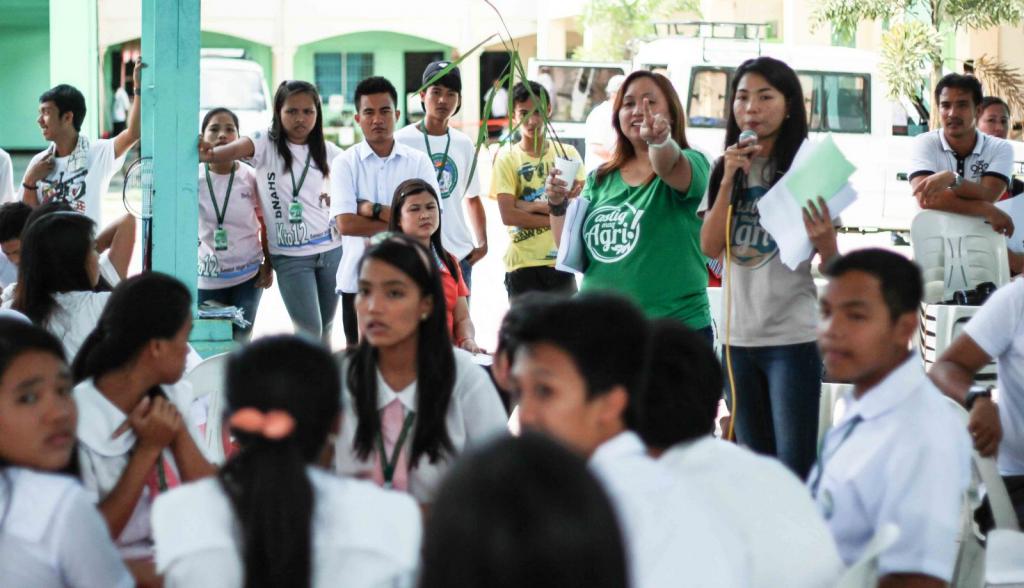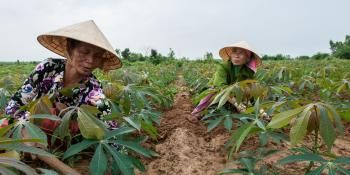Mobilizing the school youth as source of climate information

Education plays a fundamental role in equipping people with knowledge and skills to cope with the effects of climate change, particularly in the agriculture sector.
The Infomediary Campaign, being implemented by the Philippine Rice Research Institute (PhilRice), aims to mobilize high school students to serve as information providers to their parents and rice-farming communities on agriculture and climate change.
It employs several strategies such as provision of information materials for the school libraries, promotion of the PhilRice Text Center (PTC) and the PinoyRice Knowledge Bank (PRKB). PTC and PRKB are websites that contain massive information on rice production. Also, crucial to the campaign is the training of the teachers, as they are the ones tapped to teach the students.
The campaign also promotes climate-smart agriculture (CSA), which is an important approach to address the adverse effects of climate change.
Integrating CSA in the academic curriculum could increase youth awareness and action on climate change
The CGIAR Research Program on Climate Change, Agriculture, and Food Security in Southeast Asia (CCAFS SEA) supports this initiative in line with its goal of addressing climate challenges by promoting CSA in the grassroots. Integrating CSA in the academic curriculum could increase youth awareness and action on climate change. Eventually, it could also inform farming communities to better adapt to and help mitigate climate change.
So far, 108 secondary high schools, mostly under the Technical-Vocational (TecVoc) Unit of the Philippines’s Department of Education are participating and implementing the campaign. One of these schools is the Balagtas National Agricultural High School (BNAHS), a public TecVoc high school in Balagtas, Bulacan in Central Luzon, Philippines. BNAHS has been a strong supporter of the campaign since it started in 2012, which may have influenced the increase of enrolment in Grade 8 agriculture-related specializations, like Crop Production and Horticulture, by 40 percent. This provides a silver lining to the diminishing interest of youth in agriculture.
The majority of the households in Balagtas still depend on agriculture, mostly rice farming and fruit production as means of livelihood. During the past years, however, Bulacan province has seen rapid conversion of its land into urban settlements thus, farm cultivation and rice-farming households have been gradually decreasing.
Bringing the campaign to TecVoc schools like BNAHS is a strategy to drum beat the relevance of rice farming especially in the context of climate change. BNAHS established a 2000 m2 rice garden for their students as part of the campaign. There, students do hands-on rice farming activities and planted improved rice seed varieties suitable for their environment and climate change.
Margie Cabuhat, Agri Crops teacher at BNAHS, said, “with the use of registered seeds from PhilRice, our previous harvests increased from 4 to 15 cavans per hectare.” From the harvests, BNAHS gave students at least 2 kilograms of milled rice. The students appreciate this as some of them live in poverty-stricken resettlement areas. Students from rice-farming households are also given some of the harvested seeds for future cropping.
Aside from field activities, Quiz Bees form part of the activities of the Infomediary Campaign so as to gauge changes in the students’ understanding on CSA and rice farming.

The Infomediary Campaign team conducting a quiz bee. The quiz bee contest is part of the campaign's scoping studies, measuring the knowledge of the students in climate-smart agriculture and rice farming. Photo: Jayson Berto/ PhilRice
Another activity is the practical demonstration of students in front of their parents and farm workers on various climate-smart practices such as testing soil nutrients using low-cost technique, utilizing rice hull as soil conditioner, and other CSA technologies suitable to the farming communities.
youth can become effective information providers
According to a study done by the Development Communication (DevComm) Department of PhilRice, 92% of the student respondents said that their parents and other farmers in their community trust them as information sources. Moreover, this is validated by a Credibility Index Survey, which the Infomediary team administered to the farmers after scoping activities in which more than 90% of the farmers reported that they trust the information given to them by the students.
These studies show that given the right information and engaging activities, the youth can become effective information providers not just to their parents, but to their farming communities as well.
Read more:
- Visit the Infomediary Campaign website
- Video: Youth on Climate Change
- Blog: Climate change: a grown-up topic for all ages
Ryan Angelo Celis is a Senior Communication Specialist for CCAFS Southeast Asia.



